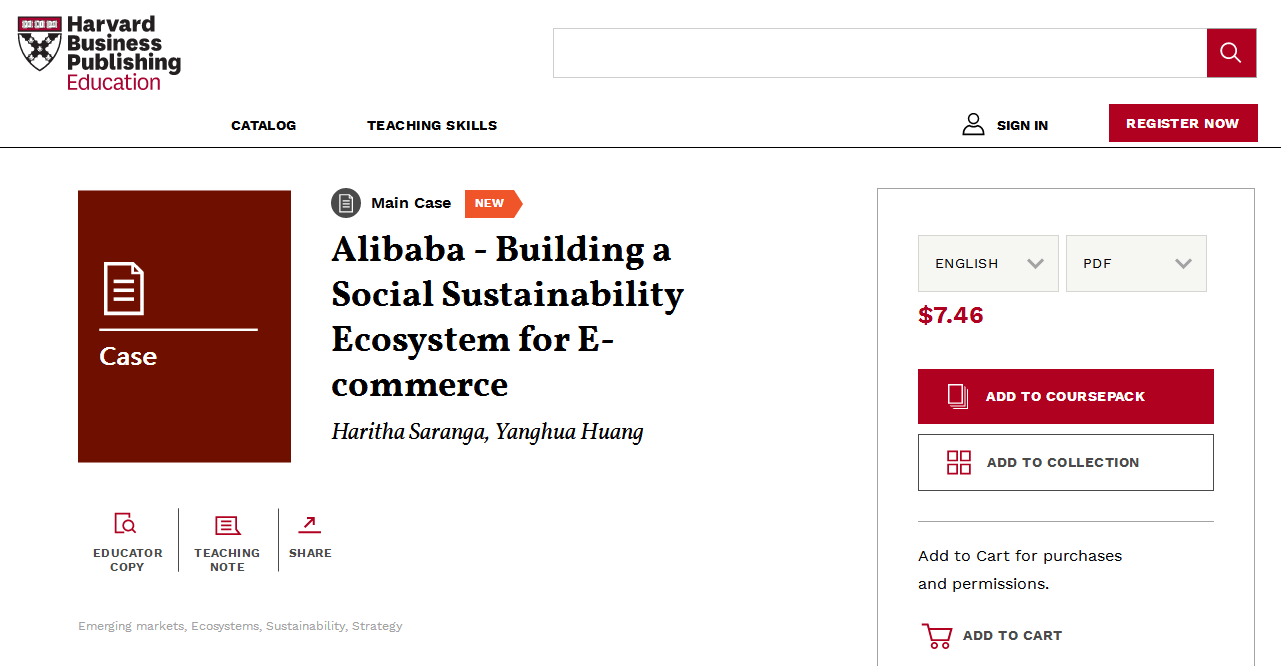近日,由Haritha Saranga与黄阳华合作的案例“Alibaba-Building a Social Sustainability Ecosystem for E-commerce”(阿里巴巴:构建社会可持续发展的电商生态),被哈佛商学院案例库收录,并面向全球出版发行。
案例系统讲述了集团自创立以来的不同发展阶段,在促进社会可持续发展方面的努力与贡献,集中反映在三个方面:(1)集团旗下各类电商平台为中国商业和消费观念的转变做出了突出贡献:(2)集团构建了一个电子商务的生态,不仅为网店提供了交易平台,而且带动了相关的第三方服务的成长;(3)集团于2014年IPO后,提出以“农村电商”作未来的三大战略之一,通过“淘宝村”和“乡村淘宝”等支柱项目促进农业电商发展和农民创业。
案例还概述了印度电商的发展概况,提出如下进一步思考的问题:电子商务有助于促进印度农村的社会可持续发展,针对印度的经济社会具体情况,已在中国取得巨大成功的阿里巴巴集团如何制定进入和开发印度市场的战略?
本案例帮助商学院各层次的学员:了解过去15年来,世界上人口最多的国家如何利用互联网和数字技术助力小微企业发展;认识阿里巴巴集团构建的电商生态,以及该生态如何为小企业和农村创业者提供成长机会;理解各电商平台的利益相关者如何塑造了电商的商业模式,以及如何营造共赢的格局;学习政府利用互联网、数字技术促进社会可持续发展和农村振兴中所扮演的角色。
Haritha Saranga,印度班加罗尔管理学院生产与运营管理专业教授,研究领域是企业的质量、可持续发展和供应链管理。她在Production and Operations Management, Journal of International Business Studies, MIT Sloan Management Review等国际期刊发表多篇论文。
黄阳华,中国社会科学院工业经研究所副研究员,研究领域是产业创新和发展、中小企业。他的研究成果发表于《中国社会科学》、《中国工业经济》、《世界经济》、China Economic Review、Hitotsubashi Business Review等知名期刊,并在《人民日报》、《光明日报》、《经济日报》发表多篇分析性文章。

访问案例链接
Summary
The case narrates the evolution of the Alibaba Group, starting with Alibaba.com in 1999, in four different phases, with the last phase beginning after its IPO in 2014. The evolution is described from a social sustainability perspective, highlighting Alibaba's initial efforts to help small businesses in China access the world markets and later, its focus on facilitating e-commerce led entrepreneurship in rural parts of China. Not surprisingly, Alibaba Group's evolution coincided with China's economic growth, as the e-commerce platforms have significantly contributed to the growth of businesses and consumerism in China. Specifically, the development of e-commerce ecosystem by Alibaba Group, created a platform where not only retail businesses, but also allied third party service providers could emerge and grow. After its IPO in 2014, Jack Ma, Alibaba Group's chairman, explicitly defined "E-commerce in rural areas" as one of the three strategic directions going forward. The case discusses in detail the two rural initiatives "Taobao Villages" and "Rural Taobao" that the Alibaba group pursued as part of its rural strategy. It is estimated that the e-commerce of Taobao villages created more than 840,000 direct job opportunities and rural Taobao reached 202 counties in 22 provinces and established 9,278 village-level service stations by August 2016. The case also provides a brief overview of the ecommerce industry in India and ends with the questions: if there is a way for e-commerce players to provide socially sustainable business opportunities for the Indian rural population and how Alibaba should plan its entry and growth in the Indian market.
Learning Objective
To learn how internet and digital technologies have helped small businesses grow during the last decade and a half, in the most populous country in the world. To understand the role of the e-commerce ''ecosystem'' that Alibaba Group has created in providing access and facilitating growth of small businesses and rural entrepreneurs in China. To study how the various stakeholders participating in market-based e-commerce business platforms can influence the business models to create synergies for all stakeholders. To explore the role of the governments in regulating and exploiting the digital technologies for social sustainability causes and growth of rural economy.
